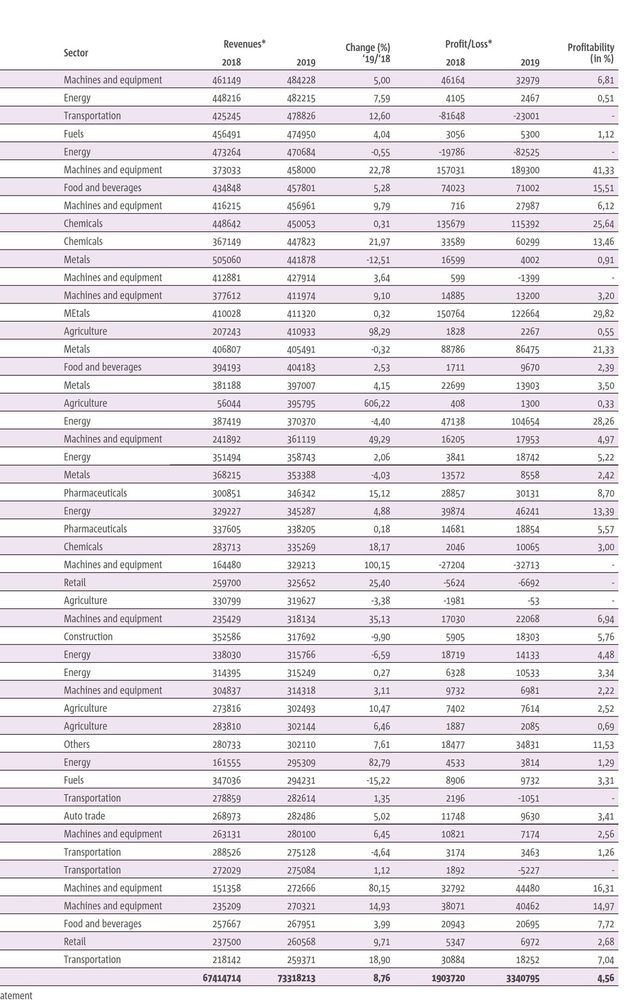The revenues of the 300 largest companies in Bulgaria increased 8% last year, reaching 100 billion levs (51.1 billion euro) in total for the first time - and probably the last for a few more years to come. The top 100 among them saw an even stronger growth - by 9% to more than 73 billion levs. But the unexpected coronavirus pandemic has halted the upward trend of the last decade. It remains unclear when the infection and its aftermath will be overcome but even the most optimistic forecasts show that the economy will not return to normal before the end of 2021.
Last year's profits were nice too: the combined result of the top 100 companies was almost 3.2 billion levs, or 70% higher year on year.
The performance of the biggest companies was stronger than the country's average. The 361,000 entities operating in Bulgaria reported total revenue of 382 billion levs, up 6.2% in 2018. In short, the 100 giants make 20% of the business in this country.
Revenues
The revenue increase of the top 100 companies is not phenomenal but it seems high and steady, as a similar growth rate of 9% was achieved in 2018 too. Inflation was also steady, about 3%, which means sales have been really growing. However, nothing will be the same in 2020: revenues will most probably see a two-digit slump and the hopes are that the drop will not be repeated next year.
The fastest-growing companies are a motley crew but several groups can be distinguished: manufacturers with expanded capacity and agricultural producers. There are exceptions, though, such as Hristo Kovachki's electricity trader Grand Energy or the new powerhouse in fuels, Georgi Samuilov's Insa Oil. The turnover of the local business of Portuguese glass producer BA Glass also skyrocketed but mainly as a result of accounting changes. A total of 33 companies posted a two-digit increase in sales.
The billion-lev companies in top 10 saw a more moderate growth: 6% to nearly 27 billion levs but the lower average result was mainly due to a drop in the revenue of state-owned National Electricity Company. The most dynamic champions include Ruse-based biodiesel producer Astra Biоplant (62%) and Lidl retailer (23%).
Only 23 companies among the top 100 posted lower sales in 2019 but the drop was minimal. Just five reported a two-digit decrease and even that was not due to lost markets but to price regulation, e.g. in steel and electricity production.
Profits up
As many as 11 companies booked profits above 100 million levs each. The leaders are state-owned Bulgarian Energy Holding and Kozloduy nuclear power plant, as well as copper producer Aurubis.
A total of 13 companies posted losses but for only three of them the negative result was more substantial. In what has become a tradition, the biggest loss maker is state-owned Maritsa Iztok 2 thermal power plant, which booked a loss of 200 million leva in 2019 and more than 700 million for the past three years. The negative ranking also features Sofia's municipal-owned heating utility and Burgas-based refinery Lukoil Neftochim.
The companies in the larger top 300 group also had growing profits and an average margin of almost 5%. The net margin of the top 100 leaders was 4.6%, compared to 3.1% the year before.
Other features
Among the 12 most outstanding sectors of the Bulgarian economy, the strongest growth last year was registered in agriculture, software development and manufacturing of machines and equipment. A total of 38 of the largest 100 companies are manufacturers - mainly of automotive components, glass and foods. A third are traders - retail and wholesale. The most numerous group comprises retail chains, petrol stations and large intermediaries in electricity and grain trade.
The ratio of Bulgarian to foreign owners among the top 100 remains unchanged: for a second straight year 51 companies have foreign shareholders, the rest are domestically-owned.
Among those with Bulgarian ownership, there are 11 state-owned and one municipally-owned company. Over the last decade, the number of state-controlled companies has been growing.
The rest are predominantly manufacturing or trade companies with western owners. The bad news is that while the ranks of large foreign investors used to increase for many years, the trend has changed over the past decade: there are no new foreign investors and the ones that have settled here are often leaving.
The 100 biggest companies employ nearly 143,000 people and the figure for the larger group of top 300 is 273,000. That makes up 10% of the employed in Bulgaria and the number has been rising very slowly over the past few years. On the one hand, that is due to a labour shortage and, on the other, to automation and digitalization of business.
The geography of top 100 is also traditional: 52 of the companies are based in the city of Sofia. Ten are based in Plovdiv, up by two on 2018, and most companies in Bulgaria's second-biggest city are manufacturing enterprises. Sofia Region has seven representatives in top 100 with plants based in Botevgrad, Bozhurishte, Chelopech. Bulgaria's third-biggest city, Varna, comes fourth, down from the third position in 2018, with six companies in top 100, including three based in the nearby town of Devnya.
The big ten
The leader, Lukoil Neftochim, has remained unchallenged for decades. Fuel trader Lukoil Bulgaria and the local unit of German copper producer Aurubis traditionally rotate at second and third place. Rarely, state-owned National Electricity Company takes the third spot.
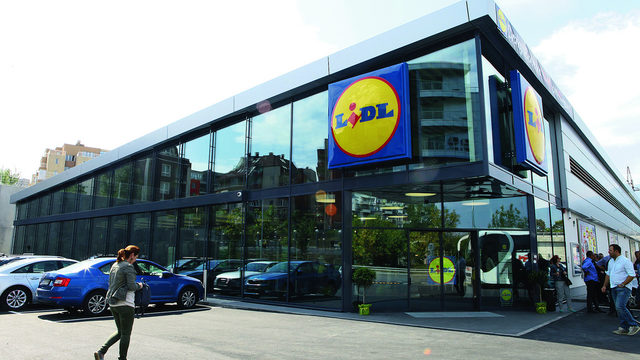
Other regulars in top 10 are state-owned Kozloduy nuclear power plant and public gas supplier Bulgargaz, as well as fuel trader Saksa, retailer Kaufland Bulgaria and biodiesel producer Astra Bioplant.
Lidl makes a debut in top 10, passing the 1-billion-lev turnover mark and catching up with Kaufland. However, the race here is between two retailers with one and the same owner.
Passive investors
In recent years, few Bulgarian companies have attracted foreign buyers. But 2019 was record weak: only Bulgarian Telecommunications Company found a new owner, again. The deal has not been completed yet but private equity firm BC Partners is expected to finalize the transaction this summer, acquiring Bulgaria's biggest telco for a price of nearly €1.3 billion. Later this year bTV may also have a new owner, Czech billionaire Petr Kellner. A concessionaire of Sofia Airport has also been finally picked this year but it will take over the management of the airport in 2021.
The poor interest of foreign investors in Bulgarian assets is not a new trend but it has deepened with the worsening of the business climate. Now the pandemic and the sinking of the global economy will make deals disappear completely.
Pandemic blow
Making forecasts for this year and next is more than difficult. The Covid-19 crisis started in March and although the lockdown was already in the past by the middle of the year, the future scenarios are mainly gloomy. As a whole, International institutions predict a drop of 7% for the Bulgarian economy.
All local surveys show a slump in companies' revenues - both of those working for the local market and of exporters. In light of this, a large percentage of companies will report a two-digit drop in revenues. Even sectors considered immune because of digital transformation, such as the software industry, are experiencing a reduction in projects. Judging by the previous crisis and the mid-year results, companies in the pharmaceutical sector and food producers seem to be more immune to the shock of the pandemic but businesses such as tourism, entertainment and luxury goods seem lastingly sunk.
Another group of companies may also be missing from the next K100 rankings: the ones hit by the prosecutor's office and/or other elements of the state. It is clear already now that the gambling companies of defendant Vasil Bozhkov, whose licenses have been revoked, will drop out of the list. The arrests of Bobokov brothers Atanas and Plamen, who own Prista Oil industrial oils and lubricants producer and Monbat electric battery manufacturer, are also likely to have a profoundly negative effect on their business.
The threats of prosecutor-general Ivan Geshev that there will be more investigations against 'oligarchs', as he is describing all big entrepreneurs, portend that there may be others too. It is not surprising that very few companies venture to forecast their revenues and profits this year, though the sampling is distorted by the more optimistic managers. Still, out of 20 companies that have submitted projections for K100, 11 expect growth this year but only three see it at a two-digit rate. Five companies believe they will repeat their results of 2019 and four foresee a drop in revenues.
Questions
- What changed in your business because of Covid-19?- Do you have any prognosis about the way you are going to develop further and about the long term effects?
Neli Kalchevaq Country manager Marsh Bulgaria
- The disruption caused by COVID-19 has seen accelerations and pivots in business practices that would have previously been deemed impossible within any organization. Three main areas are in our predominant focus and transformation as a top priority:#3 Business Planning in high uncertainty environment - embedding new practices in strategic planning in very short cycles: Recap - Review - Reinforce - Repeat;
- According to the latest pandemic scenario report, by our strategic consulting unit, pandemic waves and distancing cycles will continue >12 months and recover to pre-C19 levels estimated earliest 2022 in terms of countries GDP. We anticipate crisis in the financial sector globally and locally, following the recession in a significant part of the global business - transport; aviation, energy, tourism, etc., which together with the political tensions could trigger an extreme recession.
Darina Peneva, Managing director Stanton Chase
-The main impact is related with much more intensive use of technologies and on-line meeting tools As an interesting fact I can share that we managed to finalize first executive projects for senior executives with fully digitally - only with on-line meetings. From the other side, we see a decrease in the demand for use of executive search services with approximately 25% compared to the same period of last year. However, we see an increase in the demand for assessment and development services.
- Nevertheless that we started to see some optimistic signs during the second half of June and early July still this cannot be considered as a stable trend. The companies are still rather conservative and very much cost-oriented. I expect this approach to continue until the end of this year, especially having in mind that unpredictable situation around Covid-19. Many companies report a decrease in revenues between 10 and 50 per cent not including tourism and airline' business. Having in mind all this I expected the speed of recovery to be rather different depending on the specific sector of the economy.
Dr. Eng. Boryana Manolova, Chief Executive Officer of Siemens Bulgaria
- Although the COVID-19 crisis and the restrictions imposed in this regard did not have a significant and direct impact on Siemens Bulgaria, in the long run, the pandemic will change the way companies around the world do business.
- Technology will play a key role on the road to economic recovery. Coronavirus is already acting as a powerful catalyst for the digital transformation of businesses and societies, including through the introduction of new forms of work and communication with employees, customers, suppliers and partners as well as new business models and approaches.
For example, in the world of manufacturing, the ability to remotely monitor, control and maintain equipment can help businesses continue to operate and minimize outages. In addition to improving sustainability, digital technologies allow companies to increase their competitiveness, reduce costs and adapt their business models in a difficult economic environment.Of course, this will require enhanced integration of physical and digital assets, as well as an even greater focus on cybersecurity. As a world leader in digitalisation and automation, Siemens can offer both innovative technology solutions to support the digital transition of its clients and pro-active cybersecurity policies and actions under the Charter of Trust initiative.
Tanya Kosseva-Boshovа, Park Lane Developments Managing Partner 1. The COVID 19 situation focused the public attention on the offices that we occupy, the way we occupy them, the way we appreciate them. What has actually resulted from the Covid crisis is that many companies reassessed their office needs and reviewed the efficiency and effectiveness of their usage. The importance of the quality of the building and what it brings to its occupiers has become even more important. Modern offices are not just brick and glass - they are the modern piazzas where people find their soul mates, friends, people with similar interests and needs. Regardless of all the articles written about a home or remote work, the quality office space remains the « home » of the company, the place where colleagues mingle, exchange ideas, learn from each other, create value, enhance the corporate culture. Practically what has happened is that many companies are now requesting the areas that correspond to their current needs rather than leasing 20-30% more space to allow for the exponential growth that they expect in few years. Today, they realize that they can grow quickly by increasing the share of people and days devoted to home office work. 2. The office market is highly dependent on the development of the economy and the sectors that are providing the highest added value. The office market in our region is dominated by the growing global and local IT companies. The COVID crisis has enhanced the trends that have been around for years - digitalization, the synergy between real and virtual product, on-line services and shopping, to name only a few. What does this mean for the office market in Bulgaria? My expectation is that the demand shall remain resilient and healthy as these companies will continue to grow and expand in the midterm. At the same time, the current health and economic psychosis will prevent and postpone all new developments for the next year or so - that would put a restrain on the supply of modern office space. In other words, the market shall be again balanced and the tenants shall be able to enjoy quality offices that would boost their employees' creativity, productivity and sense of belonging. The death of the office was prematurely announced.
| New giants Chinese state-owned foodstuff producer Cofco has been making direct business in Bulgaria for two years. And almost automatically it has taken a place among the biggest grain traders in this country, as well as among the 100 largest companies with revenues amounting to nearly 400 million levs. Gas company Udinex is totally unknown on the Bulgarian market, although its business already amounts to nearly 300 million levs. The company of Georgian citizen David Avaliani has been working actively for two years and using Bulgaria as a tax address only. All of its gas deals are in Central Europe but the company does not rule out the option of trading in Bulgaria in the future. Bicycle producer Cross is known from the top 300 rankings in the previous two years but now it joins the group of top 100 thanks to the EU's decision to introduce anti-dumping customs duties on imports of Chinese e-bikes from the beginning of 2019. That has rapidly pumped up the entire sector's turnover, with Cross' growing nearly 50% to 361 million levs. The company was founded in the distant 1994. Initially, it sold bicycles made in the city of Lovech but later it switched to production of its own brand. Owners of the company are Lyuben Martinov and Lukan Lukanov. Cereals and oilseed producer Bildkom, part of the group of sunflower oil maker Oliva, makes its debut in the top 100 rankings with revenues exceeding 1 billion levs. The holding company of Angel Georgiev is likely to continue growing after it finished the construction of a new 40 million euro plant near Varna last year. The company exports its products. |
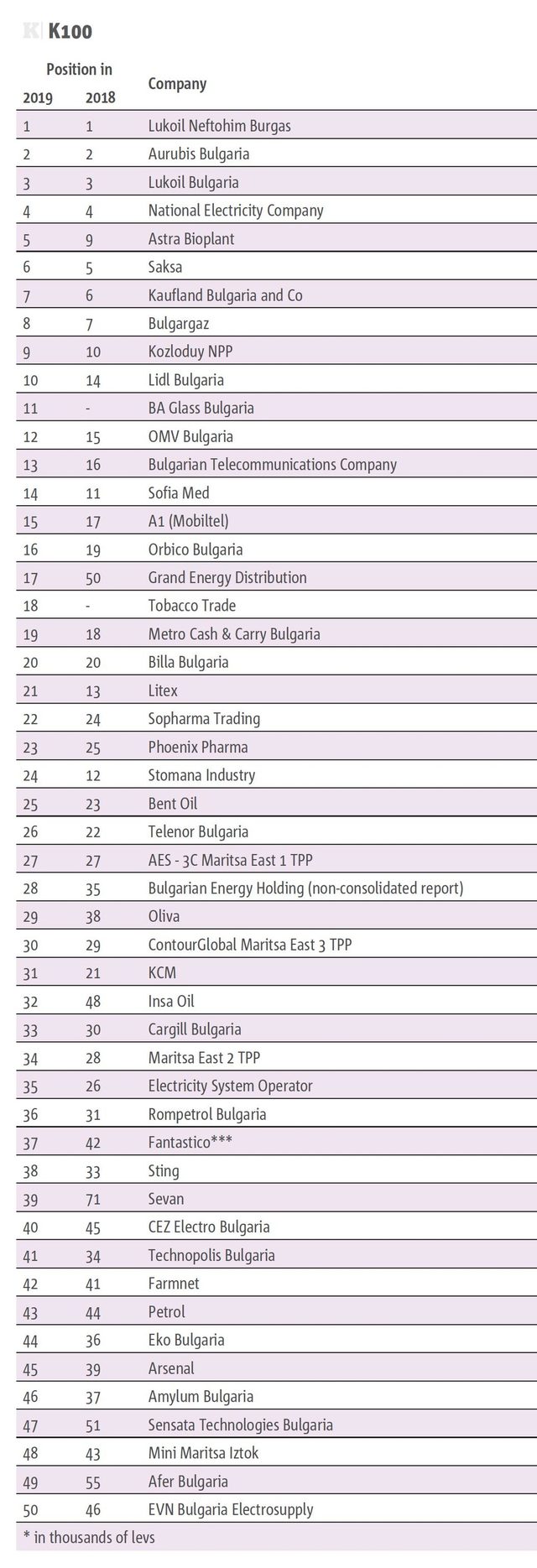
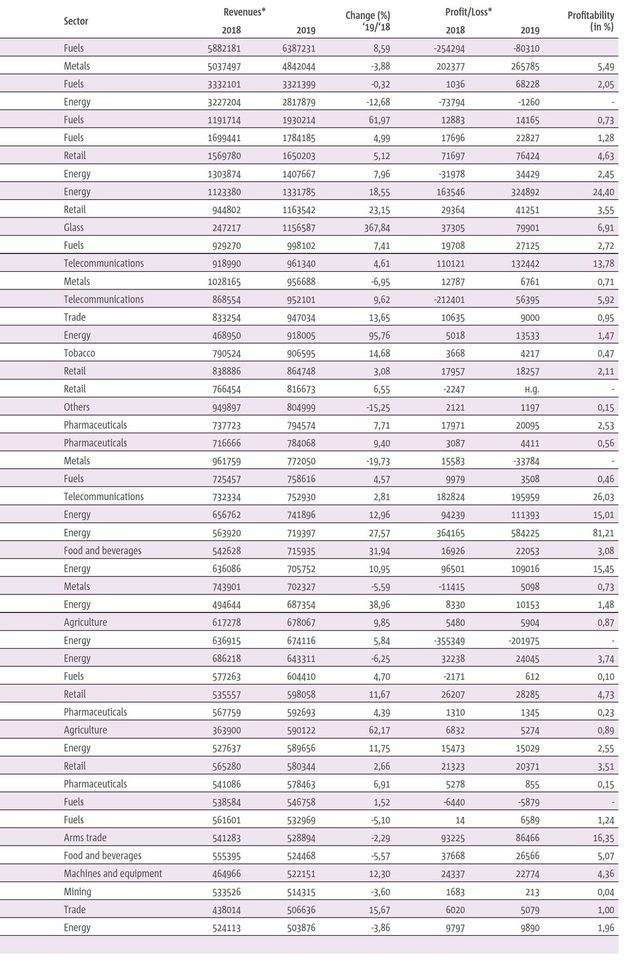
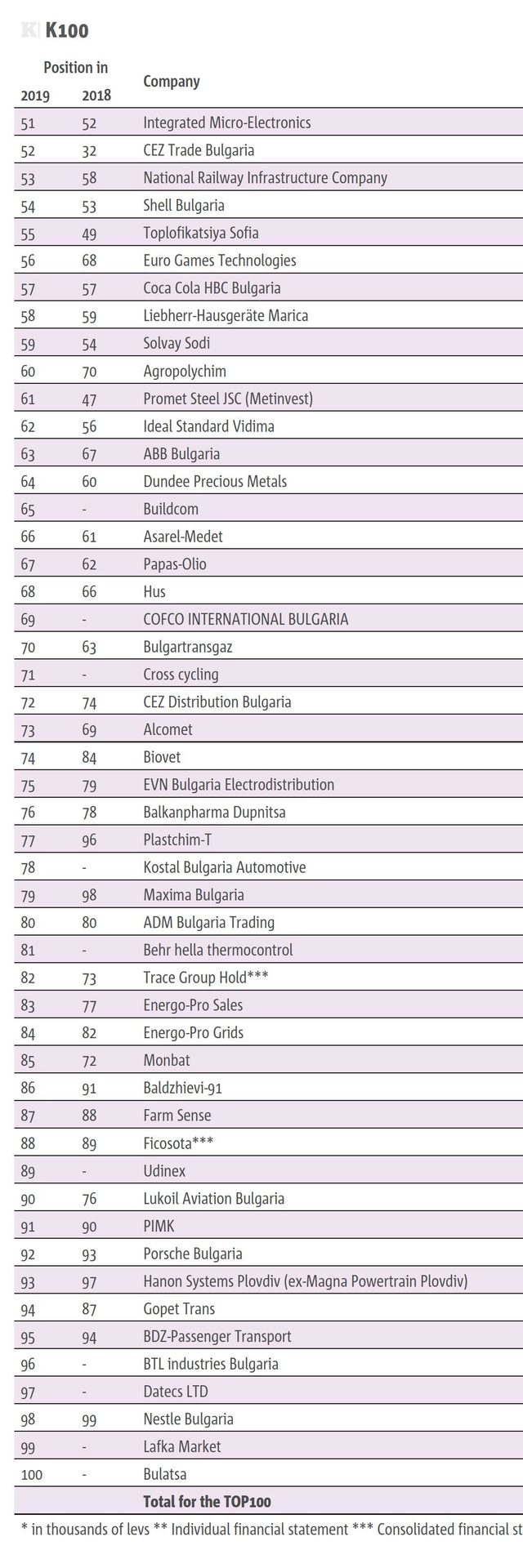
The revenues of the 300 largest companies in Bulgaria increased 8% last year, reaching 100 billion levs (51.1 billion euro) in total for the first time - and probably the last for a few more years to come. The top 100 among them saw an even stronger growth - by 9% to more than 73 billion levs. But the unexpected coronavirus pandemic has halted the upward trend of the last decade. It remains unclear when the infection and its aftermath will be overcome but even the most optimistic forecasts show that the economy will not return to normal before the end of 2021.
Last year's profits were nice too: the combined result of the top 100 companies was almost 3.2 billion levs, or 70% higher year on year.









